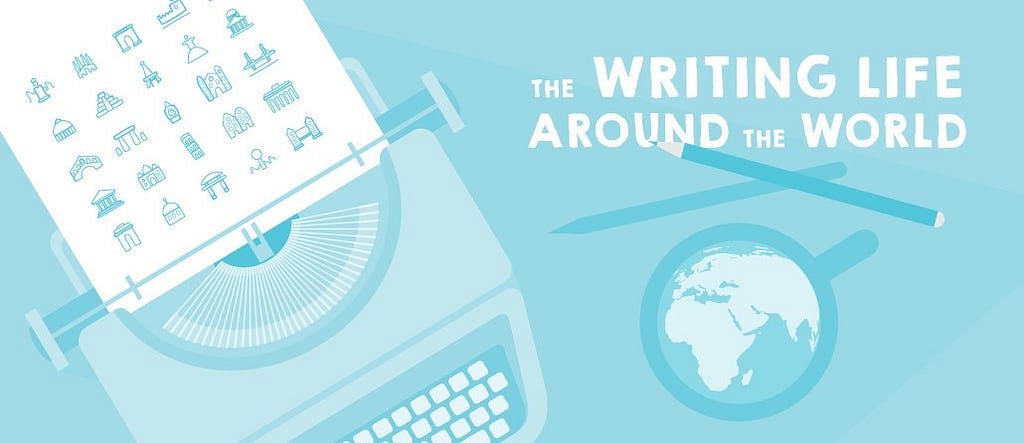writing life
Be Careless With Your Wishes: A. Igoni Barrett On The Writing Life In Nigeria

We’ve asked some of our favorite international authors to write about literary communities and cultures around the globe. We’re bringing you their essays in a regular Electric Literature series: The Writing Life Around the World. This month’s installment is by A. Igoni Barrett, author of Love Is Power, or Something Like That. His debut novel, Blackass, will be released by Graywolf in March.
One day eleven years ago I swallowed fear, stuck my neck into the noose of fate and swore I would swim or drown. I was 25 years old and had never held a job, never strayed far from my mother’s protection, never stopped depending on her for feeding money, pocket money, any money. Yet I ignored her entreaties to endure my final year in university, and after gathering up my beloved books and 2Pac CDs, I jumped into unknown waters to make my way as a writer.
Every revolution ends the instant it begins. Mine ended up in Lagos. It began as a son’s rebellion against his mother’s devotion, and today, with three books to my name, I see what I’ve achieved in all these years of revolt is to refocus my gaze on the actual bully, that stomping boot in which I’ve lived like a foot for thirty-six years. My country, Nigeria.
Before the day I left my mother’s house forever, I had lived happily enough in the rustic city of Ibadan, where I was studying agriculture at Nigeria’s oldest university. Two prominent figures of modern literature, Chinua Achebe and Wole Soyinka, had studied there along with many other Nigerian thinkers. Thus I assumed the university’s illustrious alumni were evidence of a grand tradition. At the time of my matriculation, in 1997, I had begun scribbling scraps of stories in secret, and even though I didn’t yet dare to call myself a writer I was already doing what every nascent artist does, seeking a tradition to either align with or rage against.
I found nothing there for me. No friends with similar tastes in books. No literary journals by either students or faculty. No public book readings I ever heard of. No freedom to explore the shelves of the outdated library. No writing workshops, reading clubs, or tattooed barwomen with nicknames like Head Woolf with whom I might have debated my oblivious penchant for male writers. One thing there was plenty of was angry young people in secret fraternities and student unions, but these coteries were focused on bloodletting and partying and politicking rather than literature. After seven years in that wasteland — my studies were meant to last five, but for the incessant academic strikes and school shutdowns — the only knowledge I gained about writing was that mine was not a transitory phase.
All my life I had read alone; no one had exchanged books with me or recommended writers to me.
Before 2003 — the year I attended a book reading for the first time, which was organized in Ibadan by the local chapter of ANA, the Association of Nigerian Authors — I had no idea there was any such thing as a writing community in Nigeria. All my life I had read alone; no one had exchanged books with me or recommended writers to me. I was appointed library prefect in my final year of secondary school, but that public school, like all the others, had no library worth the name. For many years I only read whatever I found at home: my mother’s romance and detective and cowboy novels, and the motley books my absent father had left behind. Even the few books I borrowed from friends’ houses (and sometimes stole, like E.R. Braithwaite’s To Sir, With Love — sorry, Remi) usually belonged to their parents.
Thus many of my favorite books were serendipitous sightings in used books stalls, the only places I could afford on my pocket money. My early years in Ibadan are still some of my fondest memories mainly because of the British Council library, a Borgesian labyrinth to my awestruck eyes, which became a veritable garden of forking paths for a teenager who had grown accustomed to never having enough books. It was a catastrophic day when the library shut down a few weeks after I chanced upon and was transported by Tolstoy’s War and Peace.
In search of a new home after abandoning my mother’s, I went to the Niger Delta, finally settling in Imiringi, a farming village about three hours’ drive from my birthplace. My peripatetic father had perched there for some months in an apartment that was paid up for a year, and I eased happily into his fully furnished, book-stocked, vacated space. I was 16 when I had moved with my family to Ibadan from Port Harcourt, the city in the Niger Delta where I was born and where my milk teeth are buried. Ibadan was where I began seeking myself through writing, but it was in Port Harcourt I first lost myself in books.
While my pigs grew fat in sleep and my catfish chased the moon across the pond’s surface, while my yams did their secret growing at night, I would write for myself until I found an audience.
The question of home resolved, all I needed was a plan. I settled quickly on one: to farm and write. I would sow the earth by day and reap the imagination at night. I would feed myself by the work of my hands, employing the knowledge I had acquired at university. While my pigs grew fat in sleep and my catfish chased the moon across the pond’s surface, while my yams did their secret growing at night, I would write for myself until I found an audience. I was young, healthy, unafraid of hard work, and responsible to no one but myself. Unlike my mother, I had no offspring to provide for, nor plans for a spouse, though a lover would be welcome, but then again, ever since I realized in my adolescence that God was a fictional character in a rambling tendentious book, I had been just fine with jerking off.
Back in 2001, my mother was the first person to ask me why did I write. My response was mumbled gibberish because I had no answer ready, though I could also hear in her tone that nothing I said would placate her. These days, whenever I’m asked that question, I do my utmost to give a different answer every time. I write because I can, because you read, because we die, because I must. I was 11 when I first experienced the must-write feeling, though it lasted only as long as it took me to realize my poems were childish. About two years later, in 1993, I got the itch again, and spent three straight days writing a play whose main characters, blond hair and all, were Nigerian-accented aliens from a Georgette Heyer universe. After that second failure, I decided to become an aeronautical engineer. Anything was easier than writing. And for anyone who has read enough to recognize how bad their writing is, nothing is harder than writing. Except not writing. Thus I wasted many years suppressing the urge to write, until, one day, just like that, I left my mother’s house to become a farmer.
About my plan in Imiringi: I knew farming was no sweat, it was writing that would require effort. Growing food from the soil and raising animals for slaughter would be a task easily done, but finding words for the images in my mind, oh boy, that was backbreaking labor.
I was both right and wrong. Farming, too, was hard. Not the farm work itself, which I never got to do. Because I never found the money to lease farmland, never got the loan I had applied to the state government for. I spent almost two years dreaming of pigs and catfish and yams, my farming spiel growing wilder the surer I became of failure. I discovered the true value of money, which can only be known when you have none. I grew my hair into locks, rather than pay barbers, and ate everything that anyone offered, including iguana (fishy-tasting), porcupine (gamy), some astringent fruit whose name I never learnt, and even a strange-looking fish — which the locals considered taboo — with a doglike dentition and appendages like breasts on its belly. I made friends whose mothers’ kitchens I can still describe, as well as friends who shared drinks and spliffs and orgasms with me.
About my stay in Imiringi: No experience in life is wasted, especially when you’re writing.
About my stay in Imiringi: No experience in life is wasted, especially when you’re writing. I was writing in Imiringi when my short story won an international competition that led to the publication of my first book from which I got the funds to launch an online literary journal that caught the attention of a Lagos-based publisher who offered me the job that ended my plan of farming in Imiringi. And so, one day, just like that, I set aside my writing to become an editor.
I arrived in Lagos in March 2007. From my earliest days in this seaside city of Cs — congested, cacophonous, chaotic, cosmopolitan, captivating, etc. — I was flung into a community of writers, editors, publishers, and booksellers. I met people whose work I had read, whose work I wanted to read, and whose conversations I noted down so others might someday read them as fiction. I met publishers who invested money in work other than that of friends and relatives, and editors who craved anonymity even as they poured their heart and skill into their jobs. There were book readings at Quintessence and Jazzhole, spoken-word poetry and drama performances at Bogobiri and Terrakulture, writing workshops by Chimamanda Ngozi Adichie and Adewale Maja-Pearce, art exhibitions at Bisi Silva’s Centre for Contemporary Art, literary festivals like the long-lasting LABAF; and everywhere I looked, in writer’s homes or at their favorite drinking spots, there were books being talked about and exchanged and recommended. I had finally found in Lagos what I went seeking at university: a self-sustaining tradition of creativity and enterprise.
In the midst of writers who acknowledge your own writing, self-denial begins to seem like self-deception.
It was in Imiringi I began calling myself a writer, but I didn’t believe it until I got to Lagos. In the midst of writers who acknowledge your own writing, self-denial begins to seem like self-deception. And so when the novelist Eghosa Imasuen — who now runs Kachifo, the publishing company I used to work for and whose Farafina imprint published the local editions of my last two books — told me all those years ago that he admired my writing, I thanked him. When the Ugandan short-story writer Doreen Baingana, on one of her several trips to Nigeria for writing residencies and to teach workshops, announced to the audience at her book reading that my second story collection was this and that, I believed her. When the poet Toni Kan — who recently signed an endorsement deal with Samsung to have his name on billboards across Lagos promoting the latest Galaxy phone — bought me beers because he enjoyed my novel, I drank up. When the Kenyan author Binyavanga Wainaina bought my first story collection in Lagos in 2010 and came looking for me to sign it, I grinned with pleasure. And when in the same year the British journalist Michela Wrong, after she returned to London from her book tour in Nigeria that included an appearance at a monthly reading series I had just then started in Lagos, wrote me an email offering to introduce me to her literary agents, I stared at my laptop screen in disbelief.
Two years was all it took. Two years of working in publishing. Two years of hardly writing. Two years of editing a magazine that was first a bi-monthly, then a quarterly, and still never sold out its 1000 print run in a city of nearly twenty million people. Two confounding years of reading accounting data that showed how American, British, and even South African publishers sold more copies of Nigerian writers’ books than local publishers could manage for the same titles. Two humbling years of watching as other Nigerian writers, many of whom lived abroad, signed bigger book deals, expanded their audience, and made good money from doing exactly what they wanted. Two long sweaty years of spending three to five hours in Lagos traffic every weekday on my way to and from work. That’s what it took for me to rebel.
But from the writing community I had found in Lagos, all I wanted at that point in my life was a pot of money and to be left alone.
In June 2009 I resigned from my editing job to strike out as a full-time writer. I knew now that farming was a pipedream, that living in a village also required money, and that I would never support myself from selling my books in Nigeria. I also knew that a community is only as useful as what the individual wants from it. From my family, my mother, I had wanted the freedom to find myself. From my nation, Nigeria, I wanted basic infrastructure, competent educational systems, and legislated respect for the most vulnerable in society, everything that every citizen deserves. But from the writing community I had found in Lagos, all I wanted at that point in my life was a pot of money and to be left alone.
Be careless with your wishes, they never become horses. Mine took more than a year to materialize as a writing residency. My first trip outside Nigeria for my first-ever residency, a real pot of shillings as well as a beach house in Mombasa for three solitary months, all of which came through Binyavanga Wainaina and the book I’d signed for him in Lagos. I got my wish, and I rode it all the way to Kenya and back, writing and living exactly as I wanted.
Five years later, I’m still here, neck in noose, fear in my belly, and swimming with all my might. Home is wherever I write, and Lagos, for now, is the place I’ve dug my teeth into.
About the Author
A. Igoni Barrett was born in Port Harcourt, Nigeria, and lives in Lagos. He is a winner of the 2005 BBC World Service short story competition, the recipient of a Chinua Achebe Center Fellowship, a Norman Mailer Center Fellowship, and a Rockefeller Foundation Bellagio Center Residency. His short story collection, Love is Power, or Something Like That, was published in 2013. In 2014 he was named on the Africa39 list of sub-Saharan African writers under 40. His first novel, entitled Blackass, will be published in the US in March 2016.
You can find all the essays from The Writing Life Around the World at Electric Literature.










